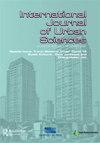Overheated behaviours and spread effects: an analysis of London’s housing market
IF 3
3区 工程技术
Q2 ENVIRONMENTAL STUDIES
引用次数: 0
Abstract
ABSTRACT This paper takes the London housing market as an example to discuss whether housing markets with more significant overheating effects have a greater influence on other housing markets. The spillover effect of London’s housing market has been the subject of much literature, but the empirical results of the relevant literature are inconsistent. This paper proposed a new perspective to explain these inconsistent conclusions: Whether the housing market is overheated or not can affect the spread effect of a regional housing market. The paper estimated the indicators of real estate overheated behaviours and market connectedness. Further, it revealed that when real estate overheated behaviours became more severe, the irrationally high house prices resulted in spread effects. The empirical results also showed that when the overheating effect occurred in London’s housing market, the rental yield of its adjacent regions significantly increased; specifically, the rental yield of a region increased with its closeness to London. The results of this study provide an explanation for the variation in spread effects. This study also indicated that when studying the influence of the relatively booming housing markets on other regions, it is necessary to test the prosperity status of these housing markets to more accurately estimate the spread effects of these markets.过热行为与扩散效应:对伦敦房地产市场的分析
本文以伦敦房地产市场为例,探讨过热效应越显著的房地产市场对其他房地产市场的影响是否越大。伦敦房地产市场的溢出效应一直是很多文献的主题,但相关文献的实证结果并不一致。本文提出了一个新的视角来解释这些不一致的结论:住房市场是否过热会影响区域住房市场的扩散效应。本文估计了房地产过热行为和市场连通性的指标。进一步发现,当房地产过热行为愈严重时,不合理的高房价会产生扩散效应。实证结果还表明,当伦敦住房市场出现过热效应时,其邻近地区的租金收益显著增加;具体来说,一个地区的租金收益随着离伦敦越近而增加。本研究的结果为传播效应的变化提供了一种解释。本研究还表明,在研究相对繁荣的住房市场对其他地区的影响时,有必要对这些住房市场的繁荣状况进行检验,以更准确地估计这些市场的扩散效应。
本文章由计算机程序翻译,如有差异,请以英文原文为准。
求助全文
约1分钟内获得全文
求助全文

 求助内容:
求助内容: 应助结果提醒方式:
应助结果提醒方式:


